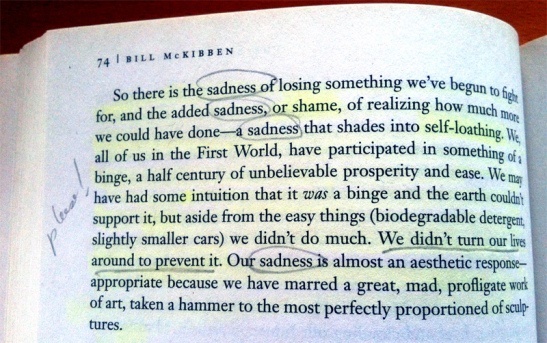A new, 73-page paper about America’s “most visible environmental activist” doesn’t mention that he’s an emotional basketcase.
When I began researching the climate debate I made a point of reading material from all sides of the issue. One of them was Bill McKibben’s The End of Nature. Published in 1989, it’s considered the first book about global warming written for a general audience.
In the years since that book appeared McKibben has abandoned journalism and become a full-fledged activist. He spent 2007 organizing climate change protests and, in 2008, founded 350.org.
In the words of a recently-completed 73-page paper by Matthew Nisbet, titled Nature’s Prophet, McKibben is now
the most visible environmental activist in the United States, pioneering new methods of social protest, and redefining the way environmental groups practice politics.
When I read The End of Nature back in 2009, I gave its nearly 200 pages a fair hearing. My paperback copy is full of highlighted sections and comments scribbled in the margins.
So did his arguments persuade me? I’m afraid not. Rather, as I wrote then, my big takeaway was that McKibben is a highly emotional individual. Yes, he cites scientific research, but the book is essentially a wail by an over-privileged, Harvard-educated 20-something who thinks the universe should remain static. The fact that the natural world is different now than on the day he was born (partly due to human activities) is, in his view, a calamity.
McKibben’s is not a measured, sensible intellect. Instead, the book talks incessantly about his feelings of “sadness.” In one paragraph, he uses the word four times (see pages 60, 68, 72, 73, 74, 160, and 162). He also tells us a great deal about his other emotional responses to environmental issues:
- grief (p.73)
- loneliness (76, 144)
- fretfulness (86)
- fear, panic and nervousness (89, 175)
- revulsion (147)
- depression (182)
- [Page numbers refer to the 2006 US paperback edition]
And then there’s his personal spiritual journey. Not only does he locate “God in nature” (61, 68), he indulges in plenty of fire-and-brimstone moralism. In his view, the Old Testament’s Book of Job is “one of the most far-reaching defenses ever written of wilderness, of nature free from the hand of man” (bold added, page 64).
He denounces humanity’s pride and speculates that God may be watching “to see if we.bow down and humble ourselves, or if we compound original sin with terminal sin” (65, 184).
According to McKibben, pre-revolutionary America was a “paradise.” He thinks we need to “rise out of the wreckage we have made of the world,” and longs for a lost Eden – the “sweet and wild garden” that humanity has replaced with “a greenhouse” (42, 147, 78).
Everyone is entitled to their spiritual beliefs. What’s astonishing is that this mediocre, melodramatic, spiritually-oriented analysis got taken seriously. Smart people actually decided that global warming was a crisis and that Western civilization needed to be abandoned on the basis of this book’s feeble arguments? Really?
As Nisbet’s paper makes clear, McKibben continues to believe that his vision of how we should respond to climate change is the “moral” one. Which, by definition, makes people who see things differently immoral.
That’s pretty much the view of a fundamentalist, isn’t it? I’m on the side of the angels, you’re evil, and my mission is therefore to smite you.
Nisbet has performed a service by pointing out that some activists, scientists, and political analysts disagree with McKibben. In his words:
McKibben’s romantic vision of a New England-style utopia and pursuit of a narrow set of policy goals have blinded him to considering alternative approaches.Moreover, McKibben’s line-in-the-sand organizing strategies may in fact be only deepening polarization. [page 50]
But a 57-page essay (followed by 16 pages of notes) about McKibben that doesn’t once mention his sappiness is surely less-than-complete. I mean, how can you spend “six months studying McKibben’s books, writing, and career” and not notice that he’s an emotional basketcase?
Why is there no mention in Nisbet’s paper of the cringe-worthy Mother Jones blog post McKibben filed from the 2009 Copenhagen climate summit? You know, the one that includes lines such as:
- This afternoon I sobbed for an hour, and I’m still choking a little.
- .my tears started before anyone said a word.
- I cried all the harder a few minutes later when the great cathedral bell began.
- .these tears were now sweet as well as bitter.
- [blog post backed up here]
Honestly.
And to think it’s climate skeptics who get accused of being in denial.






